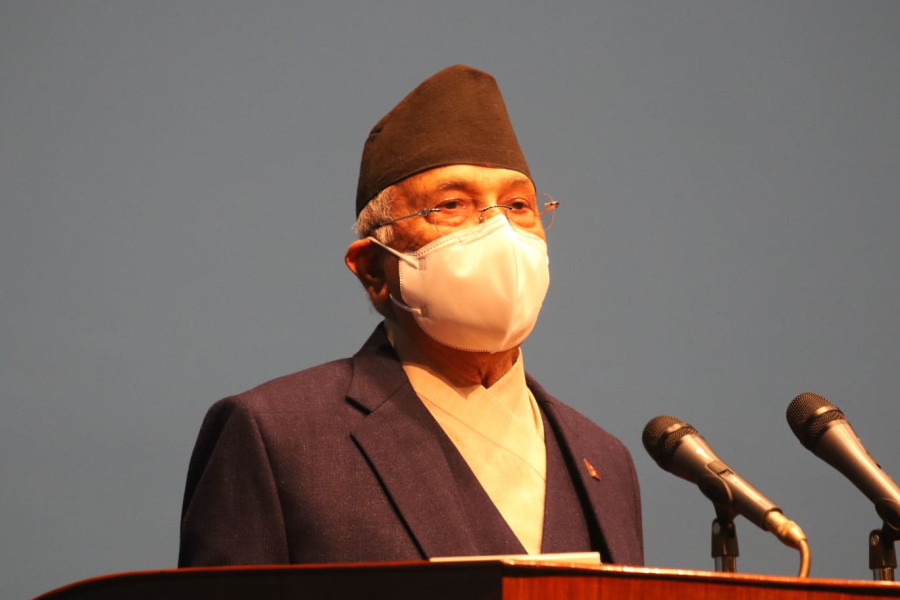Politics
Nepal Prime Minister Oli fails trust vote in Parliament
Of the 232 lawmakers present, 93 cast votes in Oli’s favour and 124 against him while 15 lawmakers stayed neutral.
Tika R Pradhan
Prime Minister KP Sharma Oli on Monday lost his confidence vote.
Of the 232 lawmakers present on Monday in the House, 93 votes were cast in favour of Oli, while 124 votes were cast against him. As many as 15 lawmakers stayed neutral.
Oli needed 136 votes to win the trust vote in the 271-strong House of Representatives.
Lawmakers from the Madhav Nepal-Jhala Nath Khanal faction of Oli’s party, CPN-UML, abstained.
The Nepali Congress and the Communist Party of Nepal (Maoist Centre), which control 61 and 49 votes, respectively, voted against Oli’s trust motion.
The Janata Samajbadi Party, which has 32 votes, however, was divided. The Mahantha Thakur-led faction stayed neutral while the Upendra Yadav-led group voted against Oli.
“As the votes cast in favour of the motion fell short to achieve a majority of the existing strength of the House of Representatives, I hereby declare that the prime minister’s motion to seek a vote of confidence has been rejected,” announced Speaker Agni Sapkota. “The next meeting of the House has been scheduled for Thursday.”
About two months after the Supreme Court invalidated the Nepal Communist Party (NCP) and revived the UML and the Maoist Centre to their pre-merger stage of May 2018, Oli last week announced that he would go for a floor test as per Article 100 (1) of the constitution.
Oli was elected prime minister in February 2018 with the support of the Maoist Centre as per Article 76 (2). But after the merger between his UML and Dahal’s Maoist Centre, his government had attained the status of a government formed under Article 76 (1), as the united Nepal Communist Party (NCP) commanded a comfortable majority in the House.
Days after Oli decided to go for a floor test, the Maoist Centre withdrew its support to Oli, reducing his government into a minority one.
With Oli failing the trust vote, the President needs to invoke Article 76 (2) to form a new government.
Article 76 (2) says in cases where no party has a clear majority in the House of Representatives, the President shall appoint as the prime minister a member of the House of Representatives who can command majority with the support of two or more parties in the House of Representatives.
That could provide the Nepali Congress an opportunity to form a government with the backing of the Maoist Centre. But the two parties fall short of around 26 seats to form a new government.
If the House fails to give a government as per Article 76 (2) or a prime minister appointed under this provision fails to win the vote of confidence within 30 days from the appointment, the President shall invoke Article 76 (3).
In that case, Oli is likely to stake claim to the government once again.
Article 76 (3) says in cases where prime minister cannot be appointed under Clause (2)... or the prime minister so appointed fails to secure a vote of confidence within 30 days from the date of appointment, the President shall appoint as the prime minister the parliamentary party leader of the party which has the highest number of members in the House of Representatives.
Oli currently is the leader of a party that has the highest number of members in the House.
If Oli is appointed as per Article 76 (3), he also needs to win the vote of confidence within 30 days from the date of the appointment.
If Oli fails that vote, once against Article 76 (2) could be invoked if any member presents a ground on which he or she can obtain a vote of confidence in the House of Representatives, the President shall appoint such a member as the prime minister.
The prime minister appointed in this manner also needs to secure a vote of confidence within 30 days. Failure to do so would lead to House dissolution.
“As per the House of Representative regulations, we will inform the President about the voting result,” said Gopal Nath Yogi, secretary of the House of Representatives. “We will send the result today itself.”




 17.12°C Kathmandu
17.12°C Kathmandu















